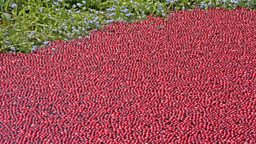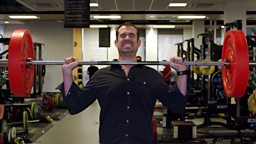Will protein supplements help me put on more muscle?
Protein supplements were once the preserve of giant bodybuilders, but today they are marketed to everyone. They supposedly help us gain muscle and avoid it wasting away as we grow older. The marketing is certainly working: it’s a £7 billion industry, and almost 1 in 20 people take them in late-middle age. But do we actually need more protein in our diets?
The experiment
There seems to be an apparent logic to the claims: muscles are made of protein, so extra protein should lead to bigger muscles. We set out to find out if this is really true. With the help of Dr Stuart Gray of the University of Glasgow, we designed an experiment to test if drinking protein supplements aids muscle growth.

We focused on whey protein, which was originally a waste product from the cheese industry. Frequently described as the highest quality form of protein, it contains all the essential amino acids, and it is very popular amongst bodybuilders, as well as regular gym goers and, increasingly, older people worried about losing their muscle.
We recruited 24 volunteers aged from 20 to 67, put them on an 8 week weight-lifting programme, and gave half a whey protein shake and half a placebo.
If the hype about protein supplements is to be believed, then those that consumed the protein should gain more muscle.
The intervention
Participants trained three times a week for eight weeks. Each training session consisted of 9 repeats of each of the following exercises:
- Leg press
- Leg extension
- Leg curl
- Chest press
- Lat pulldown
- Seated row
- Biceps curl
- Triceps curl
The weights were set to 65% of the maximum each person could lift, gradually increasing to 85% across the training programme.
After each session they consumed a drink containing either 20g of whey protein or 20 g of maltodextrin (a carbohydrate which acted as a placebo). Neither they, nor the scientists involved, knew which drink they were getting.
The results
At the beginning and end of the experiment, we measured each participant’s maximum lifting capacity on each of the exercises, their lean (fat-free) mass using a body composition chamber, their knee strength using an isokinetic dynamometer (a kick machine), and their thigh muscle thickness using an ultrasound scanner.
After doing 8 weeks of resistance training, all the participants became stronger. On average:
- Lifting capacity increased 33%
- Knee strength increased on average 31%
- Lean mass increased 1%
- Thigh muscle thickness increased 4%
However, there were no statistically significant differences between the protein and the placebo groups.
What does this mean?
In our study, taking the protein supplements had no effect on strength or muscle growth. This is in line with many other studies in healthy adults, although others HAVE shown an effect. The links below include some collections of studies with varying results.
Everyone completed a food diary showing that they were consuming on average an ample 70g of protein per day, meaning that they all had more than enough protein in their diet anyway. In a window of approximately four hours, our bodies can only use around 20 to 30 grams of protein (depending on the lean mass of each individual). Of this, a mere two grams can be used to repair muscle. Any additional protein would be burnt as energy, stored as fat or excreted in urine.
Individuals who do not get enough protein in their diet to reach the maximum levels (either because of illness, malnutrition, or having a very large lean mass) may find that protein supplements can allow more muscle growth.
What do the experts recommend?
If you’re healthy and eating a balanced diet then don’t waste your money on whey protein supplements in the hope that they will allow you to put on more muscle.
If you are concerned about your muscle mass, the NHS recommends doing at least a couple of sessions of resistance exercise each week to build and maintain strength. But we have found .
The results in detail
Knee strength increased from 465.97 newtons to 626.52 newtons in the placebo group (an increase
of 34.46%), and increased from 465.18 newtons to 595.38 newtons in the protein group (an increase of 27.99%). The two groups were not significantly different (p=0.95).
Lean mass increased from 52.18kg to 52.73kg in the placebo group (an increase of 1.05%), and increased from 57.67kg to 58.34kg in the protein group (an increase of 1.16%). The two groups were not significantly different (p=0.41).
Muscle thickness increased from 18.98cm to 19.57cm in the placebo group (an increase of 3.11%), and increased from 17.98cm to 18.99cm in the protein group (an increase of 5.62%). The two groups were not significantly different (p=0.30).
Total maximum lifting capacity (the sum of all the exercises) increased from 865.00kg to 1195.00kg in the placebo group, and increased from 920.80kg to 1171.00kg in the protein group (an increase of 27.17%). The two groups were not significantly different (p=0.20).
(All p-values are for two-way repeated measure ANOVAs reporting for interaction effects.)



























































































